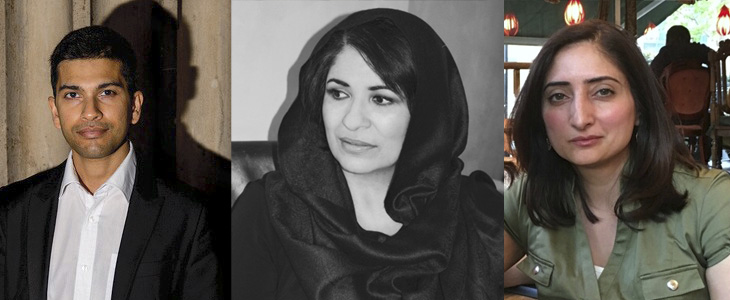Arshia Sattar’s mail plopped into my Inbox on Jan 11, 2009,
Hi Suneetha
Happy New Year
we have a vacancy at sangam house from Jan 12 to Feb 8
Would you be able to come?
Arshia
Remember what Danny Boyle did on stage after taking his Oscar statuette into his hands? I did something similar! Arshia sounded like she was offering something quite routine, but it wasn’t anything mundane at all. This was a dream come true, literally.
To the uninitiated, the Sangam House Residency for Writers is the first-of-its-kind international writer’s residency in India and an ‘on-going annual program in arts and letters’. To quote from their website: “Our residency program is designed for writers who have published to some acclaim but not yet enjoyed substantial commercial success. We want to give writers a chance to build a substantial and influential network of personal and professional relationships that can deepen their own work, in effect expanding and diversifying literature.”
They had put up a call for applications sometime in the first half of 2008, and thrilled but never really expecting to get a selection, I too collected two recommendations and sent in my sample and published work. That was in July 2008. Later on, I saw that some bloggers were talking about their Sangam House nominations, so I wrote in to Arshia, who was coordinating the program in South Asia and came to know I had been wait-listed.
You can’t imagine how disappointed I was; so near and still not there! But when I saw the list of people selected, I felt honoured about the waitlist; the writers-in-residence nominations included people like Mohammed Hanif, who wrote ‘The Case of Exploding Mangoes’. Well, I left it at that, it was almost January 2009 and I didn’t expect a vacant slot to pop up so near the conclusion of the programme. This mail that I received from Arshia was out of the blue and changed everything.
Writing and reading the whole day without the daily chores to interrupt me! A whole three weeks of no cooking, creative planning and execution of menus and a sabbatical from being a CEO with no staff! Now, that doesn’t sound like a writer’s fantasy, but a small-town middle-class writer-cum-journalist-cum-mom-cum-wife, who was writing because she simply couldn’t keep away from the alphabet, still has just so much space and no more. Think ‘A Room of One’s Own’ and Virginia Woolf. I was at the threshold of such an offer and just had to say YES!
I decided to live on the dream and said yes, and so began my Sangam experience in January 2009.
Jan 12, the date that Arshia offered was too soon, in fact barely six hours away from my opening her mail; and I had a hundred things to wrap up and plan, including the family menus (Oh! Yeah, I am the proverbial lizard holding up the roof)
My work as a freelance writer had several commitments which would be left hanging if I left Trivandrum pronto; then there were the tickets to see to, I had to call up Arshia and check the route….Everything passed off well and I arrived on the morning of the 16th of Jan into the unbelievable calm and cool of the Adishakti Properties, Pondicherry, the seat of the Sangam House Residency in India and also into the warmth of an unforgettable friendship with Mike, Lydia, Leonora, Aseem and Honggyu all of whom I will introduce in a minute.
The Adishakti Properties is the seat of a theatre company of the same name, and the company of the excellent artists resident there, Vinay, Nimmy, Suresh, Aravind and Arjun lent the extra spice to the residency days. While these guys were around, there was music, discussions on every possible topic under the sun and cinema. Within our writer’s group, it was more focused; there was the learning of the other culture, outings to good old Pondi town and night life; all mixed with the absolute quietness of the mornings and evenings, apart from the writing and its peripheral activities. But my idea of a residency also included in-depth discussions about the craft of writing and maybe even writing exercises. But that was my mistake, I confused the residency with a workshop, but the mistake was soon rectified.
You are really pampered at Sangam, I have to say that! A great and cosy room with comfortable beds, clean linen and enough blankets, moving space in case you want to pace a bit inside while you are thinking a scene out, a clean and nice bathroom with hot water and so on. There is a table to write and a cupboard for your stuff, just like you would have at home. Laundry service was also provided and clothes would be delivered back to you ironed to perfection.
The room I had occupied singly was on the ground floor and the other two women in the residency group were housed around the open corridor on the same floor. The men were on the upper floor and we had two ISPs working the web for the laptops. Unfortunately there was no web connected on the common PC which was in the dining space in a separate thatched country-type hall just off the guest house, but you could work offline and print out anything from there.
The meals provided were south Indian cuisine for breakfast and a mix of north and south Indian cuisine for lunch and dinner and these were served at fixed timings at the dining hall. We all usually took out our plates to the benches and tables outdoors under the trees and sat round chatting till work beckoned us back to our rooms.
We also raided the kitchenette at the guest house for those hunger pangs outside meal times that we writers usually have at odd hours. The fridge and larder were well stocked with bread, spreads and fruits and milk, tea and coffee and a limited quantity of liquor as well. The kitchenette saw people ganging up on coffee/fruit sessions even at midnight. Fruit was mostly out of the Adishakti orchard and we had yellow yummy papayas, just ripening guavas, and luscious pomegranates freshly plucked for us.
Now tell me what else you would want for inspiration? Peace and quiet? Nature?
You had them all at Sangam. Except for the time when the Adishakti artists practise, or the meal time banter, the place is really quiet. And the grounds are vast, and truly pretty in the golden evenings and dewy mornings. Close your eyes and you could listen to the umpteen birds that practise choir at any time of the day or night. So all we had to do was to apply our posteriors to our chairs or where ever you choose to sit and attack with the pen or mouse whatever your weapon happens to be.
But let me introduce the fellow writers who were resident with me in the incomparably beautiful guesthouse at Adishakti. We were the last batch and about a dozen people had come and gone before us since November 15, 2008. The www.sangamhouse.org website lists the alumni.
Lydia Bravo, who is from Spain but resident in London, is a poet who writes in Spanish and a published translator handling Spanish and English.
Leonora Christina Skov is an established writer in Denmark, with two novels behind her.
Honggyu Son is an academic and a popular and award winning novelist in Korea.
Michael Obert is a renowned writer in German and has several non-fiction writings to his credit.
Aseem Shrivastava is an economist and academic of repute who hails from India but with his footprints spread globally.
And it is with these reputed names that poor old I rubbed shoulders for an entire two weeks. But my self-esteem which has always been poor got a power shot during that fortnight I spent at Sangam. I found that I wasn’t as ordinary a writer as I thought from the comments of my fellow writers who read my work and expressed their opinions. I also realised I was at least as prolific as the rest of them. The publishing credits were in varying degrees, the people from outside India seemed to be more successful. And the strangest thing was that except Aseem and me, the representatives from India resident currently, and both of us who write in English, the rest of them write in their mother-tongues.
Mike writes his travelogues in German, Lydia writes her poetry and her current novel in Spanish and adeptly translates them into English, Leonora writes in Danish and explains her literary ventures to me in English, and Honggyu, writes and handles only Korean. Once Lydia, Honggyu and I shared a hilarious time with each of us talking in our own language and laughing away at how it contrasted against the other’s speech.
Closeness inspires confidences, and all of us had heart-to-heart sessions on our life experiences. We found that love, family, relationships and life was the same in all corners of the world, albeit slightly different definitions. I remember an incident on the day I left Sangam I attended a call for Mike on the public phone. I had to call out to Mike who lived on the upper floor and he was engrossed in work so heard me only after my voice had grown frantic.
Mike came running down with a greatly worried expression which had me curious and I hung round wondering what was troubling him and if I could help him in some way. Mike soon found that the call was only from the Adishakti Office about some travel arrangement, and I watched the tension melt away from his face. After keeping the phone down Mike told me that for a few moments he had worried about his Mom back in Germany. I thought of the time when my brother had rushed back on emergency leave when he suspected that Dad was in hospital. The nomad life of a writer doesn’t make any of us different about emotions.
We also found time for one outing to Pondi town on a late evening. We came back really and truly late and riding the waves of cool night air and I do believe most of us went in straight to write. Pondi has that effect on you.
A typical day at Sangam had you routing for coffee at the kitchenette whenever you woke up or proceeding straight to the diner for the first meal of the day. Some of us even woke with the birds that set up a dynamic dialogue as early as 4 am. Chat sessions around the breakfast table would go on till someone realised the time and all would rush back to work. Lunch followed the same pattern, so did dinner. Snacks at the kitchenette were intermissions. In the midst of this food-rote, some people took off for Auroville for visits or shopping or massages; others took off to Pondi for the day when work was at saturation point. But generally work was prolific with all of us. We ate, wrote, ate more, and wrote more again. We even heard the Dalai Lama one day when he was at Auroville.
Soon it was the 29th of Jan, my last day at the residency and the day for the reading session organised at Chennai, and all of us left in two great cars accompanied by Arshia who had come in a day earlier. The session was at the Taj Hotel, the new one, and we had some press coverage too. All of them except me left for a bash, and I went back home from Chennai.
People have asked me what I did at and what I gained from the residency. The experience and exposure was invaluable. I did manage to write a lot in spite of the fact that I was terribly home sick triggered by my withdrawal symptoms from the web. I am laptop phobic and I was not able to access the web as much as I usually do. At home I have two PCs with two different ISPs open round the clock. Lack of web access made me cut my allotted days short and I left a whole seven days earlier. But I did manage to write about 10000 words of my current novel, a number of short stories and a screenplay.
As for what I gained, it’s not something I can say easily. I went there with one impression of myself and came back with all that changed. In short, I found out not who I was but who I wasn’t, in the company of all these wordsmiths. They all were well travelled persons most of whom were leaving for other destinations for more taste of the world outside their circle. I was someone who had travelled alone very little, and that too only recently. I had ‘roots’ as they all told me several times, and I wasn’t the brave cosmopolitan woman I believed myself to be. But we all stood at par as writers, and I was at last confident of my writing.
When I look back, Pondi looks like a dream still, I can’t believe it happened until I look at my PC and the folders holding the work which I did after Sangam. Sangam came to my life at a time when I had started doubting my credentials as a writer, and two months later, I have a bunch of new pals across the globe and a new confidence as a writer. I know my mindset has changed forever, and I believe all those Indian writers who manage homes and jobs and yet manage a lot of writing, needs a residency to sort themselves out and begin on the real journey of a writer.
They have invited applications again for the 2009 residencies with Sangam House, so in case I have inspired you, please check the link
Suneetha is a writer, translator and journalist who works from her home at Trivandrum in idyllic Kerala in South India. She writes and translates into two languages viz English. She writes fiction in English and poetry in Malayalam.


